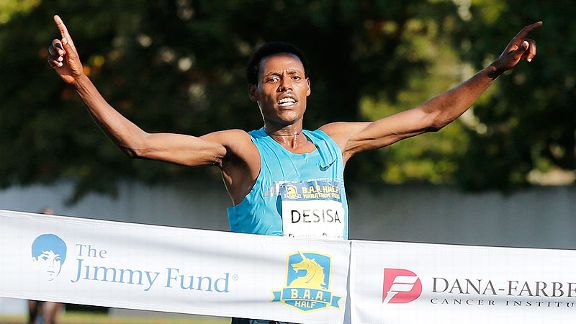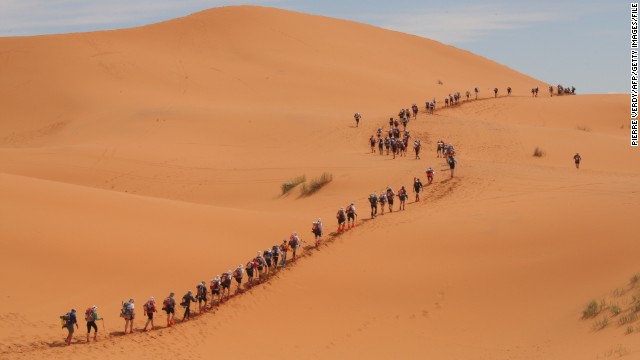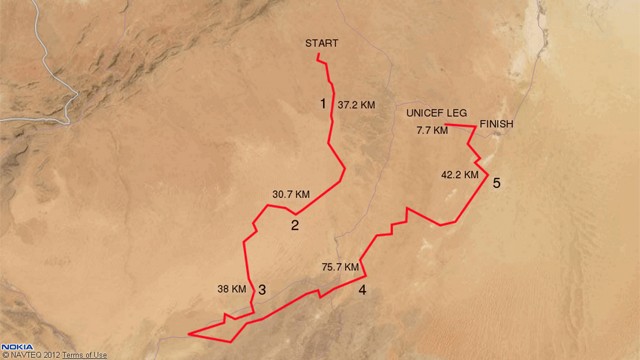Now Rkia El Moukim can buy those wheels she's been wanting.
The diminutive Moroccan blazed to a record-setting win in the Hy-Vee Road Races half marathon on Sunday at Drake Stadium. El Moukim's time of 1 hour, 11 minutes, 18 seconds is believed to be the fastest time ever run by a woman in Iowa.
El Moukim's 23-second margin of victory earned her $12,000, the biggest purse of her career, and a chance to break away from public transportation in her home country.
"Now I can buy a car," said El Moukim, who takes a train or bus around her home in Ifrane. "Working hard for that money is not easy. I've been training hard for this."
El Moukim said she would have to investigate what brands of cars she could find in Morocco. She chopped 50 seconds off the 2013 course record set by Ethiopian Belainesh Gebre despite contending with an hour delay caused by a thunderstorm that rolled through Des Moines shortly before the scheduled 7:30 a.m. start.
The $12,000 top prize for the half marathon once again brought a gaggle of evenly matched African men to Iowa for a mass sprint on the stadium's blue oval. Ethiopia's Mosinet Geremew kept his composure to fight off persistent Kenyan Kimutai Cheruiyot and win by 1 second in 1:03:34. Goitom Kifle was third in 1:03:37.
At least two men, fourth-place Aschalew Meketa and fifth-place Dominic Ondoro, entered the 10k finish chute before realizing their mistake and making a left-hand turn into the half marathon corral. Meketa ran 1:03:39, Ondoro 1:03:40.
Neither man likely would have caught Geremew, who was a few meters ahead on the track's blue oval.
"When we were going into the stadium I was No. 3," said Cheruiyot, confirming that Geremew was too far ahead of everyone. "I like the course. The wind wasn't bad."
Ethopians also played big roles in the 10-kilometer races. Birhan Nebebew of Ethiopia sliced 6 seconds off Emmanuel Bett's 28:23 course-record effort of 2013 to take the men's title. Nebebew won $5,000. Kenya's Emmanuel Bor grabbed second in 28:23.
Ethiopian Etalemahu Habtewold smashed Makida Abdela's 10k women's record by almost a minute after running 32:36. Habtewold won by 17 seconds over Kenya's Sophy Jepchirchir.
"She picked it up at 5k," said Jepchirchir, speaking for Habtewold who, like the other Ethiopians, spoke no English. "Once she picked it up it was difficult for me to close the gap. I tried my best."
Jepchirchir, El Moukim and Risper Gesabwa, the Hy-Vee half marathon runner-up, dueled last week in the Crescent City Classic 10k last weekend in New Orleans. In that one, Gesabwa took the win in 31:43, with El Moukim grabbing third and Jepchirchir fourth.
On Sunday, El Moukim saw a chance to open a gap over Gesabwa going up East Court Avenue to the State Capitol. El Moukim lengthened the gap around Gray's Lake before entering the difficult stretch of Bulldog Hill on 28th Street.
BULLDOG HILL: Volunteers provide needed inspiration for long climb
"It was long and it went up," El Moukim said the mile-long climb. "I feel like I'm dying and she's (Gesabwa) strong. I told myself, 'You can do it, you can do it. The finish line is not too far away."
This has been a big year for the El Moukim. The 26-year-old set a half marathon best of 1:10:03, earned $10,000 for winning the Shamrockin' Run 8k in New Orleans in March and set a personal-best time last weekend.
El Moukim will stay in America until June to search for more races.
"My manager will find something for me," El Moukim said. "I hope because I win (Sunday), I will be back."
Pasca Cheruiyot of Fort Dodge was the top Iowan in the half marathon races, taking fifth and earning $3,000.
Kenya's Nelson Oyugi won the men's 5k in 13:59. The women's winner was Ethiopia's Bertukan Feyisa in 16:15.
DRAKE RELAYSROAD RACES
At Des Moines
Men's Half Marathon Leaders
1. Mosinet Geremew 1:03:34; 2. Kimutai Cheruiyot 1:03:35; 3. Kifle Goitom 1:03:37; 4. Aschalew Meketa 1:03:39; 5. Dominic Ondoro 1:03:40; 6. Samson Gebreyohannes Gezaha 1:03:47; 7. Belete Assefa 1:03:58; 8. Julius Keter 1:04:03; 9. Reuben Limaa 1:04:08; 10. Geoffrey Kenisi 1:04:30; 11. Eliud Ngetich 1:04:46; 12. Shadrack Kosgei 1:05:44; 13. Jacob Chemtai 1:06:29; 14. Ayele Megersa 1:07:03; 15. Edward Tabut 1:08:33; 16. Gilbert Okari 1:08:52; 17. Joseph Ekuom 1:14.28; 18. Chris Robertson 1:14.38; 19. Malcolm Campbell 1:15:02; 20. Mikhail Romanov 1:15.39.
Age division winners—14-under—Niclaus Baack 1:52:32; 15-19—Michael Schemm 1:29:11; 20-24—Chris Robertson 1:14:38; 25-29—Justin Herrick 1:17:19; 30-34—Sapolai Yao 1:16:34; 35-39—Jeremy Williams 1:24:05; 40-44—Joel Frye 1:16:47; 45-49—Michael Kabela 1:24:08; 50-54—Jerry Lack 1:22:09; 55-59—Pete Sandler 1:41:00; 60-64—Bob Grote 1:36:13; 65-69—Robin Gray 1:43:53; 70-over—John Schneller 1:49:47.
Women's Half Marathon Leaders
1. Rkia El Moukim 1:11:18;2. Risper Gesabwa 1:11:41;3. Almaz Negede 1:13:25;4. Susan Jerotich 1:15:40; 5. Pasca Cheruiyot 1:16:24; 6. Meseret Basa 1:17:04; 7. Danna Kelly Herrick 1:18:20; 8. Lyubov Denisova 1:22:36; 9. Andrea Aerts 1:31:41; 10. Kassandra Moore 1:32:06; 11. Ellen Pollard 1:35:13; 12. Ava Henning 1:36:25; 13. Jana Titus 1:36:26; 14. Emily Funk 1:36:39; 15. Linnea Stephens 1:36:50; 16. Jodi Sunderman 1:36:50; 17. Lindsey Meyer 1:36:54; 18. Laura Steinauer 1:37:29; 19. Celia Bravard 1:37:35; 20. Monica Curry 1:37:41.
Age division winners—14-under—Emily Peterson 1:49:14; 15-19—Linnea Stephens 1:36:50; 20-24—Kassandra Moore 1:32:06; 25-29—Danna Kelly Herrick 1:18:20; 30-34—Jodi Sunderman 1:36:50; 35-39—Jodi Hanson 1:39:12; 40-44—Stacey Eddie 1:44:31; 45-49—Ellen Pollard 1:35:13; 50-54—Cathy Lack 1:44:15; 55-59—Patty Croonquist 1:44:09; 60-64—Jane Wickman 1:51:55; 70-over—Breta Westlund 2:40:46.
Men's 10 Kilometer Leaders
1. Birhan Nebebew 28:16;2. Emmanuel Bor 28:23; 3. Kenneth Kipkemoi 28:30; 4. Simon Ndirangu 28:35; 5. Josphat Bett 28:36; 6. Robert Ndiwa 28:55; 7. Aissa Dghoughi 29:08; 8. Julius Koskei 29:20; 9. Sammy Rotich 29:27; 10. Julius Kogo 29:29; 11. Ben Anderson 32:05; 12. Jason Thomas 32:32; 13. Michael Rodriguez 34:33; 14. Scott Johnson 35:41; 15. Derek Wilkerson 35:57; 16. Dave Baitinger 36:28; 17. Brad Johnson 36:32; 18. Ezana Yigzaw 37:37; 19. Lee Anderson 37:46; 20. Jonathan Ault 38:05.
Age division winners—14-under—Luke Mohan 39:28; 15-19—Ben Anderson 32:05; 20-24—Michael Rodriguez 34:33; 25-29—Derek Wilkerson 35:57; 30-34—Scott Johnson 35:41; 35-39—Matthew Wilson 38:20; 40-44—Dean Schwickerath 39:03; 45-49—Michael Hulett 38:10; 50-54—Jeffrey Nietert 38:37; 55-59—Tim Kelly 48:33; 60-64—John Philip Magnier 46:01; 65-69—Steve Hamilton 48:40; 70-over—Tom Kirkwood 50:58.
Women's 10 Kilometer Leaders
1. Etalemahu Habtewold 32:36; 2. Sophy Jepchirchir 32:53; 3. Caroline Kiptoo 34:23; 4. Cynthia Jerop 34:33; 5. Atalelech Asfaw 36:04; 6. Ellen Ries 37:17; 7. Susie Duke 38:15; 8. Trisha Schlick 40:46; 9. Molly Christensen 41:35; 10. Stephanie Mortenson 41:58; 11. Elise Fiscus 42:46; 12. Carrie Van Quarthem 43:22; 13. Monica Capper 43:39; 14. Jennifer Mills 43:56; 15. Caitlyn Diimig 43:57; 16. Erin Ross-Johnson 43:58; 17. Whitney Noe 44:15; 18. Torey Smith 44:41; 19. Erin Jansen 44:44; 20. Erin Bailey 44:46.
Age division winners—14-under—Maggie Fuhrman 55:32; 15-19—Chloe Matthews 49:34; 20-24—Caitlyn Diimig 43:57; 25-29—Ellen Ries 37:17; 30-34—Susie Duke 38:15; 35-39—Trisha Schlick 40:46; 40-44—Carrie Van Quathem 43:22; 45-49—Sharon Stubler 45:16; 50-54—Teresa Thomas 52:09; 55-59—Laurie Briden 53:14; 60-64—Caryn Westman 1:07:58; 65-69—Geraldine Moore 1:29:51.
Men's 5 Kilometer Leaders
1. Nelson Oyugi 13:59; 2. Haile Tegegn 14:01; 3. Diriba Degefa 14:01; 4. Cleophas Ngetich 14:11; 5. Dan Kremske 14:35; 6. Simion Chirchir 14:45; 7. Shadrack Kiyia 14:50; 8. Silas Kisorio 15:33; 9. Daniel Sevcik 16:04; 10. Paul Kemei 16:49.
Age division winners—14-under—Matthew Dubberke 20:47; 15-19—Ryan Ross 17:26; 20-24—Daniel Sevick 16:04; 25-29—Brady O'Neil 18:12; 30-34—Silas Kisorio 15:33; 35-39—Travis Ripperger 20:13; 40-44—Scott Lochhead 18:53; 45-49—Ron Kudron 20:17; 50-54—Stephen Feld 19:39; 55-59—Scott Winkel 19:48; 60-64—Tim Murphy 20:07; 65-69—Robert Larson 24:22; 70-over—Gary Muhrcke 25:07.
Women's 5 Kilometer Leaders
1. Bertukan Feyisa 16:15; 2. Hirut Damte 16:21; 3. Delilah Dicrescenzo 16:25; 4. Lilian Mariita 16:32; 5. Sarah Kiptoo 17:02; 6. Traci Kresser 17:31; 7. Nicole Benson 18:42; 8. Erin Block 18:57; 9. Cassandra Aerts 19:09; 10. Angie Voight 19:34.
Age division winners—14-under—Nicole Watters 21:10; 15-19—Laura Gann 19:41; 20-24—Nicole Benson 18:42; 25-29—Traci Kresser 17:31; 30-34—Sarah Janiak 20:33; 35-39—Erin Block 18:57; 40-44—Denise Forney 25:03; 45-49—Christine Comito 21:34; 50-54—Susan Knight 27:21; 55-59—Maureen Peters 28:51; 60-64—Rhonda Weers 31:21; 65-69—Marty Palecki 35:22; 70-over—Carole Rider 45:25.

 AP Photo/Michael DwyerLelisa Desisa is among the favorites after winning both the full and half-marathons in Boston in 2013.
AP Photo/Michael DwyerLelisa Desisa is among the favorites after winning both the full and half-marathons in Boston in 2013.
 Marathon des Sables (MDS) is a grueling multi-stage running event that covers more than 220 kilometers, and is held each year in southern Moroccan Sahara.
Marathon des Sables (MDS) is a grueling multi-stage running event that covers more than 220 kilometers, and is held each year in southern Moroccan Sahara.